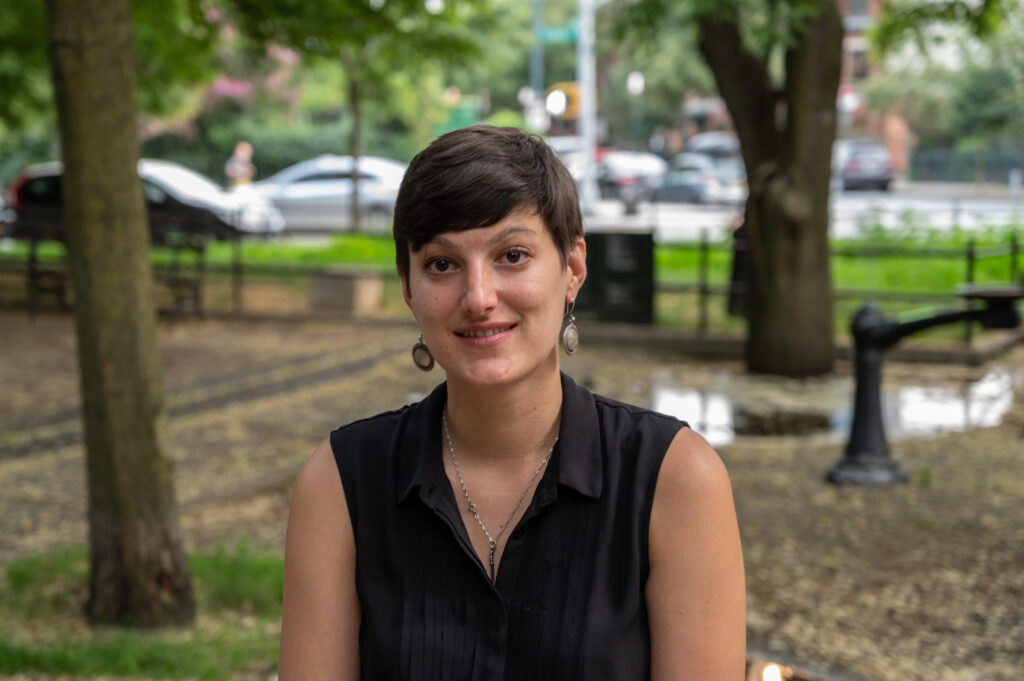
Futures Initiative Graduate Fellow Coline Chevrin has served in several roles at FI. In this interview Coline discusses why she considers her fellowship to be a key part of her journey as a doctoral student.
How has your time as the longest serving FI fellow shaped your outlook on change and transformation within the academy?
Working with FI has reinforced my feeling that, considering how things are now in the academy and in CUNY, with so many budget cuts, and with students and instructors being overworked, transformation is a step-by-step process. I think that the key is to start working from the margins. Programs such as the CUNY Peer Leaders, or team-taught courses taught collaboratively by a community college and Grad Center professor, have shown their transformational capacity for the students and instructors engaged. These programs remind us that it is by establishing concrete spaces for people to make things differently that we allow ourselves to be creative and daring as scholars. I also think that being part of a team of fellows during the PhD experience is one of the most important incentives to get through. Grad school can be such an alienating process, so building human connections with people from other programs has also been fundamental for me.
What have you learned from your many different roles and responsibilities at the Futures Initiative over the years?
I appreciate that all my roles allowed me to build on my previous professional experiences. I had to learn how to manage time between taking my classes, teaching, and FI. I also had to think a lot about what FI does and how to communicate it during my first year, and this knowledge of what everyone was actually working on and building helped me to work effectively as assistant director. This was a new challenge because I started to support administratively all branches of the program. I had to anticipate people’s needs and be very sharp regarding logistics to assist the director of our program, Adashima Oyo. Now, as a HASTAC Scholars Co-Director, it is nice to have a bit more freedom to come up with new ideas. I also really enjoy working in pair with my co-director Parisa Setayesh. We make a good team.
…discussing experiences with fellow PhD candidates, something we generally do during the second part of the team weekly meeting, has been key. I have learned about tools and methods, but also general strategies to survive a sometimes hostile environment.
What experiences at the Futures Initiative stand out to you as influencing your academic work or assisting in your progress towards your degree?
Once again, the most important part for me has been being part of a collective of fellow students. I have learned a lot regarding inclusive and transforming teaching practices, which helped me optimize my syllabus and the time I spend on each course I teach. I also think just discussing experiences with fellow PhD candidates, something we generally do during the second part of the team weekly meeting, has been key. I have learned about tools and methods, but also general strategies to survive a sometimes hostile environment. Finally, it has been very interesting to me to understand the “making” of academic programs, and to learn more about funding, pitching, administrative circuits, and so on. I think so many people within the academy have great ideas but encounter difficulties in their implementation because they do not necessarily have the tools to navigate the system.
What has your time on the team done to influence your ideas for a future career path, within or outside of the academy?
One of the important take-aways from FI is that one can work within the academy without necessarily going exclusively towards a tenure-track position. So much can be done from such programs and initiatives. They provide economic support for students, which is just essential, but they also create spaces for a more creative and political engagement to try building what we want our academy to be. It’s like spreading seeds in different interstices and support them so they can grow on their own.






